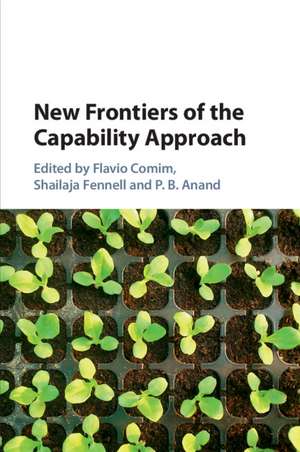New Frontiers of the Capability Approach
Editat de Flavio Comim, Shailaja Fennell, P. B. Ananden Limba Engleză Paperback – 2 iun 2021
Preț: 469.22 lei
Nou
Puncte Express: 704
Preț estimativ în valută:
89.80€ • 97.51$ • 75.43£
89.80€ • 97.51$ • 75.43£
Carte tipărită la comandă
Livrare economică 23 aprilie-07 mai
Preluare comenzi: 021 569.72.76
Specificații
ISBN-13: 9781108448185
ISBN-10: 1108448186
Pagini: 670
Dimensiuni: 151 x 228 x 36 mm
Greutate: 0.89 kg
Editura: Cambridge University Press
Colecția Cambridge University Press
Locul publicării:Cambridge, United Kingdom
ISBN-10: 1108448186
Pagini: 670
Dimensiuni: 151 x 228 x 36 mm
Greutate: 0.89 kg
Editura: Cambridge University Press
Colecția Cambridge University Press
Locul publicării:Cambridge, United Kingdom
Cuprins
Introduction Flavio Comim, Shailaja Fennell and P. B. Anand; 1. Key-note chapter: on Sen on the capability of capabilities: the story of a not-for-profit enterprise J. G. Meeks; Part I. The Need for New Foundations: 2. Capabilities and the common good Jonathan Warner; 3. Measuring the meta-capability of agency: theoretical basis for creating a responsibility indicator Mathias Nebel and Maria-Teresa Herrera-Nebel; 4. Equal liberty, reflective equilibrium and education: defending Rawls from Sen's criticisms Caroline Souza and Gabriel Goldmeier; 5. On epistemic diversity, ontologies and assumptions in capability approaches Josh Platzky Miller; 6. Collective agency capability: how capabilities can emerge in a social moment Razia Shariff; Part II. The Operationalisation Frontier: 7. Sen's capability approach, social choice theory and the use of rankings Flavio Comim; 8. Selecting capabilities for development: an evaluation of proposed methods Morten Byskov; 9. From resources to functioning: rethinking and measuring conversion rates Enrica Chiappero, Paola Salardi and Francesco Scervini; 10. Demystifying the use of simultaneous equation models for operationalising the capability approach Jaya Krishnakumar and Ricardo Nogales; Part III. The Application Frontier: 11. Human development in India – comparing Sen and his competitors Des Gasper; 12. Sustainable human development measurement issues: a new proposal Mario Biggeri and Vicenzo Mauro; 13. Inequality and capabilities: a multidimensional empirical exploration in Chile Macarena Orchard and Martina Yopo; 14. Living wages in international supply chains and the capability approach: towards a conceptual framework Stephanie Schrage and Kristin Huber; 15. For a happy human development Tadashi Hirai; 16. Capability of capabilities and aspirations of the middle classes in India Meera Tiwari; 17. The value individual and community social resources Paul Anand; Part IV. The Housing and Urban Frontier: 18. Tracking the transition from 'basic needs' to 'capabilities' for human-centred development: the role of housing in urban inclusion Shailaja Fennell, Jaime Royo-Olid and Matthew Barac; 19. Building regulations through the capability lens: for safer and inclusive built environment? Prachi Acharya; 20. Cities and the capability approach P. B. Anand; Part V. The Education Frontier: 21. Formal education, well-being and aspirations; a capability based analysis on high school pupils from France Robin Vos and Jérôme Ballet; 22. Other people's adaptations: teaching children with special educational needs to adapt and to aspire Cristina Devecchi and Michael Watts; 23. Expanding children's capabilities at the writers' workshop Helena Kiff; Education and 'the capability approach Caroline Hart.
Recenzii
'Because of its breadth and depth, this book does not explore just the frontiers of the Capability Approach but also the frontiers of social and economic studies in well-being, freedom and justice. Building bridges between disciplines and tackling diverse topical issues, it represents a real challenge to conventional perspectives on development and quality of life. It is also a great resource for scholars of the capability approaches, both for the fascinating reconstruction by Gay Meeks of the evolution of Amartya Sen's thought and for the other excellent chapters that push the boundaries of the framework.' Pasquale De Muro, Università degli Studi Roma Tre
'The capabilities approach (CA), and its associated insistence on understanding poverty as a multidimensional phenomenon, is now an established field of scholarship and practice in international development. By simultaneously striving to fortify its theoretical foundations, methodological instruments and policy applications, those extending the pioneering contributions of CA’s famous founders now preside over a sophisticated, mature and fruitful body of work. This volume amply showcases both the breadth and depth of these efforts, manifest in an array of countries and sectors.' Michael Woolcock, World Bank and Harvard University, Massachusetts
'The capabilities approach (CA), and its associated insistence on understanding poverty as a multidimensional phenomenon, is now an established field of scholarship and practice in international development. By simultaneously striving to fortify its theoretical foundations, methodological instruments and policy applications, those extending the pioneering contributions of CA’s famous founders now preside over a sophisticated, mature and fruitful body of work. This volume amply showcases both the breadth and depth of these efforts, manifest in an array of countries and sectors.' Michael Woolcock, World Bank and Harvard University, Massachusetts
Descriere
Leading scholars from a range of disciplines come together in an inclusive discussion of the latest techniques and issues examined by the capability approach.
